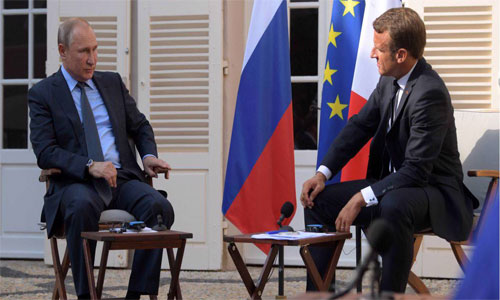Although the European Union and Russia are part of the same landmass, they don’t have all that much in common. In fact, Russians have yet even to decide where their country resides in the world. The bulk of its territory is in Asia, but over 70% of its people live west of the Ural Mountains. Russians have no interest in associating themselves with East Asia or the Islamic South, so their only choice is to go it alone or orient themselves toward Europe.
But going it alone is risky. Russia is a nuclear-armed colossus, yet it is declining demographically, economically, and technologically. The country still earns its living by exporting fossil fuels and other commodities, which is hardly sufficient for maintaining superpower status in the twenty-first century. It is increasingly at risk of becoming a junior partner to China.
The only alternative, then, is Europe. But both sides are prisoners of their respective histories. Memories of oppressive rule under the czars and the Soviets remain raw in Central and Eastern Europe, particularly in Poland and the Baltics, and Russian President Vladimir Putin’s annexation of Crimea and military campaign in Eastern Ukraine have reinforced distrust of Russia across the region.
Russia’s relationship with the rest of Europe is also determined by its history. Reeling from the Soviet collapse throughout the 1990s, Russia has adopted a nineteenth-century mentality since Putin came to power in 2000. The Russian elite, harking back to the Czarist period before the Bolshevik Revolution, regards their country as a European great power – even a hegemonic one, in the case of Eastern Europe – which pits it directly against the EU.
The EU’s raison d’être is to transcend zones of influence in Europe, because that is the only way to prevent a return of the power struggles and catastrophic wars that culminated in the first half of the twentieth century. And yet Russia is simply too large to be integrated into the EU (indeed, it is unclear who would be integrating with whom).
Even if that were not the case, Russia – or at least its leadership – does not share the EU’s values. In addition to championing democracy, judicial independence, and the rule of law, the EU has renounced any revision of borders by force. While geographic proximity demands that Russia and the EU manage their relationship in as mutually advantageous a manner as possible, the Kremlin’s ongoing war in Ukraine’s Donbas region makes this all but impossible.
Nonetheless, French President Emmanuel Macron has made renewed efforts to improve EU-Russian relations, not least by meeting with Putin in the run-up to the G7 summit in Biarritz last month. In Macron’s view, it is not in Europe’s interest to drive Russia further into China’s arms, or to stand by and watch the ongoing disintegration of US-Russian arms-control treaties. With respect to arms control, American and European interests are not the same, and today’s US administration cares little about Europe or its views on any given issue.
But Macron’s efforts raise many questions. For starters, it isn’t obvious what role Europe could play in renewing the global arms-control regime. Without the US, Europe has little to offer Russia on the issue of intermediate missiles. It would be stuck in the position of trying to convince two unwilling parties to reach a new agreement. And that doesn’t even account for China, which has also developed an intermediate-range-missile capacity.
Europe does have something to offer Russia economically. But improving economic relations is simply impossible without verifiable progress in the implementation of the Minsk Protocol to end the conflict in Donbas. It is unclear if Putin would be ready for that.
But the real problem between Russia and the EU is the issue of democracy. Putin and the Russian oligarchy’s greatest fear is that Ukraine’s 2014 Maidan revolution could be replicated on Moscow’s Red Square. The Kremlin does not blame NATO for that possibility; it blames the EU. Anti-NATO rhetoric is a tried and true propaganda trope that exploits many Russians’ ingrained fear of a Cold War bogeyman. But the real threat in the eyes of the Russian oligarchy is the EU and its promotion of democracy and the rule of law.
The Russian and European systems are fundamentally incompatible, representing contradictory values and vastly different approaches to foreign and domestic policy. In the nineteenth century, czarist Russia was the leader of the “Holy Alliance,” a reactionary bulwark against the bourgeois revolutions sweeping in Europe. This dynamic was reversed under the Bolsheviks after 1917, when Russia became the cradle of revolution. But under Stalin, it returned to pursuing essentially the same aims as the czars, particularly when it came to crushing independence movements in Central and Eastern Europe.
Putin’s regime has followed a similar trajectory, retreating to the nineteenth century, allying with the Orthodox Church, and launching attacks on the “decadent West,” with tirades against homosexuality and liberalism. The Kremlin’s active support for illiberal, nationalist forces in Europe and the United States is just one part of this larger picture.
As desirable as an improvement in relations between the EU and Russia would be, it will come neither quickly nor easily. On the main questions of Ukraine and democracy, Europe can scarcely give an inch.
Home » Opinion » What’s Freezing Europe-Russia Relations?
What’s Freezing Europe-Russia Relations?
| Joschka Fischer

